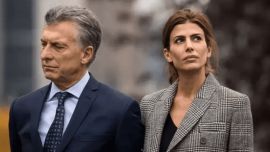The Central Bank today hiked its benchmark interest rate from 45 percent to 60 percent – the world's highest – in an effort to halt a sharp slide in the value of the peso against the dollar, which plunged to a new record low.
At the time of publishing, the peso was selling at 39.60 per US dollar in Banco Nación. It reached 42 per US dollar in exchange houses in the City.
Earlier Marcos Peña, President Mauricio Macri's influential Cabinet chief, was forced to deny the government was facing an imminent economic disaster.
"We are not facing economic failure," said Peña. "This is a transformation, not failure. In that transformation there are difficult moments."
Nonetheless, the nation's TV channels were glued to developments, reporting frantically on the peso's slide against the dollar, minute by minute.
The peso opened nearly four percent lower against the dollar on Thursday morning, having plummeted almost seven percent the day before, despite explicit support from the International Monetary Fund for the government's policies.
The IMF's backing, however, failed to bolster the currency. IMF chief Christine Lagarde said Wednesday she had agreed to Macri's request to speed up payments of a US$50-billion loan in a bid to shore up the economy.
Speaking at the opening of the Council of the Americas business chamber in the capital, Peña attributed the market volatility to Argentina's recent history.
"We are the country that has the most times violated its international contracts in the world, which has lied and cheated the rest of the time, and has shown again and again – until now – that it is not willing to seek fiscal balance and depend on its own resources," he said.
He insisted the path taken by Macri since he took office in December 2015 is one "of fiscal balance, development and growth."
The current exchange turbulence was attributable to "structural vulnerabilities" following a massive drought that affected agricultural production, the main generator of foreign currency, and a "change in the financial and commercial context in the world, notably due to tensions between the United States and China," Peña argued. "There are no magic solutions, you have to go for the truth."
Macri had sought to soothe the turbulence in a statement before markets opened on Wednesday, assuring Argentines that help is on the way.
"Over the past week, we have had new expressions of lack of confidence in the markets, especially over our ability to obtain financing for 2019," Macri acknowledged.
He said the IMF would provide "all the funds necessary to guarantee the fulfillment of the financial programme next year."
In return for IMF support, the government has committed to reducing its budget deficit to 2.7 percent this year, from 3.9 percent in 2017, and to 1.3 percent of GDP next year. However, there has been increased speculation that the financial body will ask Macri's government to tighten spending and cut the deficit further in response.
In total, the peso has tumbled more than 50 percent so far this year
The Central Bank said in a statement that it was hiking its benchmark interest rate in response to the current currency scenario and the risk of greater impact on local inflation. The rate had been set to 45 percent earlier this month.
Speaking at the Council of the Americas event, Interior Minister Rogelio Frigerio said: "It's a difficult day, clearly."
- TIMES/AFP/AP






















Comments